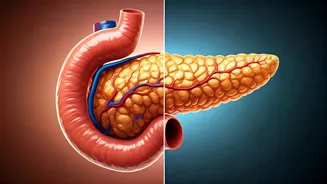Unhealthy Eating Habits
Poor dietary choices are a significant threat to pancreatic health. Consuming a diet laden with processed foods, saturated fats, and excessive sugar can put
undue stress on the pancreas. Regularly eating high-fat meals forces the pancreas to work overtime, producing more digestive enzymes than it should. Over time, this constant strain can lead to inflammation and increase the risk of pancreatitis and other pancreatic disorders. Moreover, a diet rich in sugary foods can cause spikes in blood sugar levels, which over time, can contribute to insulin resistance and potentially lead to type 2 diabetes, further impacting pancreatic function. Therefore, it is important to include a balanced diet with vegetables, fruits, and lean protein.
Excessive Alcohol Intake
The overconsumption of alcohol is a well-established risk factor for pancreatic damage. Alcohol is metabolized by the liver, and during this process, it releases toxic substances that can directly injure the pancreas. Chronic alcohol abuse is a leading cause of pancreatitis, a painful inflammation of the pancreas that can severely impair its function. Repeated episodes of pancreatitis can lead to permanent damage, including chronic pancreatitis, which can cause digestive issues, diabetes, and increase the risk of pancreatic cancer. Furthermore, alcohol can interfere with the pancreas' ability to produce insulin, affecting blood sugar regulation. Moderation or abstinence are key to protecting pancreatic health.
Smoking and Tobacco Use
Smoking is known to increase the risk of various cancers, including pancreatic cancer. The chemicals in tobacco can damage the cells of the pancreas and increase the risk of inflammation and cellular mutations. Smokers are at a significantly higher risk of developing chronic pancreatitis and pancreatic cancer compared to non-smokers. The toxins inhaled during smoking can directly impact the pancreas, making it more susceptible to damage. Additionally, smoking can reduce blood flow to the pancreas, hindering its ability to function properly. Quitting smoking is one of the most effective steps people can take to reduce their risk of pancreatic disease and safeguard their overall health.
Ignoring Chronic Pain
Often, certain underlying medical conditions, if not treated, can indirectly affect the pancreas. Gallstones, for example, can block the bile duct and cause bile to back up into the pancreas, leading to inflammation and pancreatitis. Similarly, chronic conditions like diabetes, though not a direct cause, can worsen pancreatic function. Persistent abdominal pain or discomfort should be evaluated by a healthcare professional. Failure to manage these conditions adequately can trigger or exacerbate pancreatic issues. Timely medical attention and proper management of existing health problems are crucial for maintaining pancreatic health.
Lack of Hydration
Dehydration can affect the overall functioning of organs, including the pancreas. When the body is dehydrated, the digestive enzymes produced by the pancreas become more concentrated, potentially increasing the risk of inflammation. Proper hydration is essential for ensuring that bodily functions, including digestion, occur smoothly. Drinking enough water helps maintain the proper consistency of pancreatic secretions and supports the transport of nutrients. Moreover, dehydration can exacerbate other health problems. Regular intake of water is vital for supporting pancreatic health and overall wellness, so it's very important to keep it a priority.















